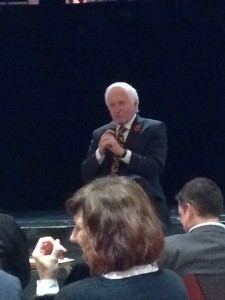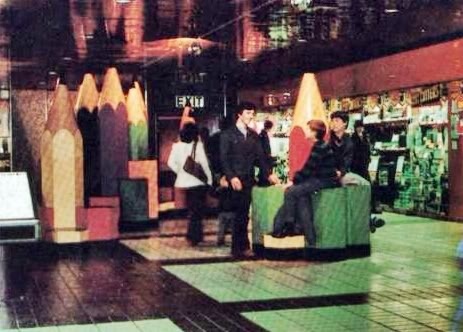The BBC’s flagship political debate show, Question Time, is usually spent on the sofa with my iPhone and Twitter. There’s a running joke I tweet before the show starts regarding a checklist: the list consists of biscuits, teddy bears to throw at the tellybox (so it doesn’t get damaged when anger is vented at politicians), and an amusing random third item.
As an avid viewer, I jumped at the chance to be in the audience as soon as I found out that they were going to be recording in Middlesbrough. I never dreamed I’d actually get to be in it. There must be loads of applications every week, but it seemed I fitted whatever demographic they were looking for. I got an email on the Tuesday asking me to phone the people responsible for putting the audience together. I did, but the line was constantly engaged. I didn’t hold out much hope, but I left my details so they could call me.
If your name’s not down, you’re not coming in…
While walking the dog on Wednesday morning, I thought I’d give them a call on the off-chance it would be answered. It was answered first time. The well-spoken lady on the other end found my details from my application and we had a chat about the kind of things I’d like to see in the debate. I mentioned the stealth privatisation of the NHS and, equally worrying, the lack of information from the various news outlets about what’s actually going on. I also mentioned the growing rift in the coalition escalated by Norman Baker’s resignation, and the knee-jerk lurch to the right that the Tories have had to counter UKIP’s popularity.
The lady seemed satisfied with my answers and asked if I was available on Thursday night from 6pm. Hell yeah I was! She said she’d send me an email with more details and she ended the call with “See you tomorrow night.” Wait, what? That’s it? I’m in! Yay!
As promised, an email arrived later that day with my ticket number and instructing me to bring photo ID. All audience members were to email a question to the producers before the show, and to provide another question on the night. I duly sent my question and monitored the news for something else I could ask about.
Arrival
“Arrive between 6pm and 6:30pm” proclaimed the email. I got there at 5:55pm and there was already a queue outside Middlesbrough Town Hall.
“Is this the queue for Question Time?” I asked the bloke at the end.
“I hope so,” came the reply. I spotted our local Labour MP, Andy McDonald, just ahead of us in the queue so I had to be in the right place.
The gent I spent much of the evening with was an electrical engineer from Middlesbrough. He’d applied many times to get in the BBCQT audience, even applying for shows as far south as Sheffield. He wasn’t successful last time BBCQT was in Middlesbrough, which was around four years ago, so he was particularly happy to be selected this time.
We chatted while we waited in the queue, mainly about how I’d lived in Middlesbrough for ten years and had never been in the Town Hall. Middlesbrough Town Hall is a multi-roomed auditorium which has seen some extremely famous names over the years. There was speculation as to which room would be used, mainly from him as I had no idea of the options.
The holding pen
The queue started moving forward, and slowly we made our way in through the Box Office door. The queue was being let through ten people at a time, as security was searching everyone as they entered. And boy, were they. We went down the stairs into The Crypt (which is apparently an awesome room for live shows) and emptied all metallic objects from our pockets while the security people scanned us with handheld metal detectors. Once we’d been searched, we made our way to the registration table where we showed our email ticket and photo ID. Our names were checked off the list and we were given a sheet listing tonight’s panel and a small card on which we were to write our second question. We then sat down at one of the many tables set out around the room.
The card asked for your name, age and occupation, and the instructions stated to keep your question under thirty words (twenty was preferable). I wrote a question about fuel prices – it had been in the news that the chancellor, George Osborne, had said he was expecting fuel companies to lower prices as oil prices had gone down. I asked if it would actually happen and when.
My new companion (whose name was Stephen, according to his question card) wrote a question about transport links in the north east. We chatted more until a researcher came to talk to us. He was looking to gauge the room’s concerns and asked about the issues we’d like to see debated.
As the researcher moved on to the next table, another man joined our table with his question card and a sheaf of papers he’d obviously printed from the internet. They were liberally covered in highlighter pen. He mentioned something about “corrupt council doings in this very building”. Stephen asked if he worked for the council. He replied that he didn’t, but he was “one of those annoying people who sat in on planning meetings and other meetings”. Stephen and I both raised eyebrows. This chap’s description of himself would be shown to be true very soon.
Dimbles and Weird Man
A familiar voice over the speakers asked us for our attention, and we turned to face the front and there he was – David Dimbleby. In the flesh, standing at the front of the room with a microphone in his hand.
He told us to make sure we had fun and we enjoyed the evening, but most of all to be involved – an opportunity to be in the BBCQT audience and just sit in silence is an opportunity missed. Applauding good points made by the panel or the audience allowed the audience at home to see the and hear how the points were being received by the studio audience.
He said that the questions we’d submitted were sorted into categories – in their experience, a lot of similar questions were always asked and the most popular topics from us would be the ones used. If our particular question wasn’t selected, there was a good chance that a similar question would be.
David went on to say that before the recording, there would be a rehearsal chaired by the floor manager, Stan Royle, and using audience members as panellists. This was so the sound and lighting technicians could ensure everything was working as it should and at the correct level. It was also to get the audience warmed up.
When the panellists were brought on and the recording started, there’d be a question that would be used to get the panel into the swing of things. This first question wouldn’t be recorded but would be debated exactly as you see it on television.
Remember the weird man who came and sat next to Stephen and I? Well, it was his turn to have his say. When David asked if there was anything we’d like to ask him, Weird Man came out with “Can we shout out?” David told him he could.
“Good. I just did,” said Weird Man. You know that feeling when everyone is looking in your direction? I had that right there as the entire room looked at our table and wondered who this plum was.
Weird Man asked, “How much is edited out at the end?”
David told us that there is no editing, unless someone uses the F word. The show is recorded pretty much as you see it on the tellybox, in one take.
There were a couple of other, sensible questions then Weird Man piped up again. “Who books the panel? You’ve got two Scottish politicians on and one from Great Yarmouth. There’s no local politicians on. Could this be because no local politicians are ministers?”
“I know where they’re from,” replied Dimbles calmly, to much applause from the audience. “They’re deliberately not local because otherwise it wouldn’t appeal to a national audience.” Dimbleby went on to explain that there was no point having back-benchers on because they don’t speak for the government or shadow government.
With that, he briefed us on when to applaud at the start of the show and to continue applauding at the end until we were told to stop. He again told us to enjoy ourselves and he was off. Everyone started queueing to go up to the studio and Stephen and I made sure we were far behind Weird Man. There was no way I was sitting next to him.
The studio
Eventually, we made it upstairs and it was like walking into the contents of the television screen. The BBCQT set was there with “MIDDLESBROUGH” in big white letters around the front of the Q-shaped centre platform. Stephen and I were sat three rows from the back, pretty much in the centre of the row. To our relief, Weird Man was on our left, on the other side of the aisle.
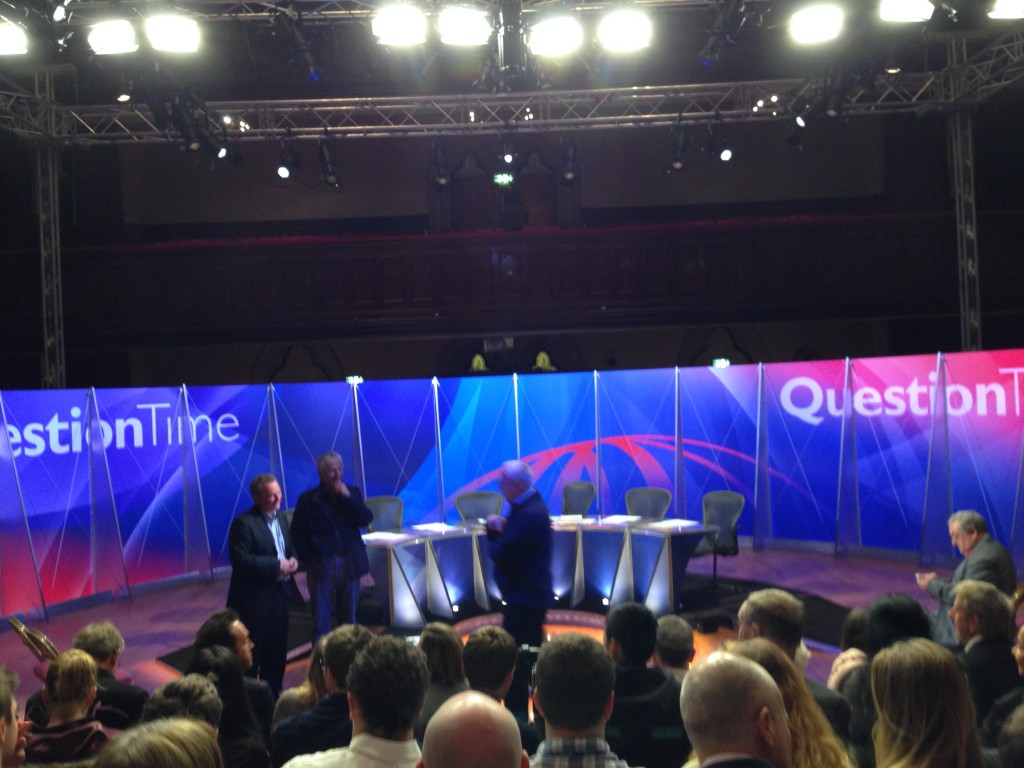
We were asked to turn our phones off completely at that point, in case they interfered with the radio mics. Our fake panellists were chosen and they sat in the chairs. Sound tehnicians attached lapel microphones to them. One lady in a red dress had no lapel, so the sound guy attached the mic to the arm of her dress, much to the amusement of the audience. The floor manager, Stan, gestured to the sound technician. “He doesn’t even work here, I don’t know who he is.”
Rehearsal, questions and the panel
The rehearsal debate started. Unused questions from previous shows were used – the first question was “how do you combat the child obesity crisis?”
The fake panellists gave standard answers until the young guy who was sat in what would be Melanie Philips’ chair answered by saying that it was all the fault of school bullies not doing their job properly. Fat kids soon slim down once they are teased. Strangely, this point made some kind of twisted sense and the lad got a round of applause for it.
As the rehearsal continued with a questions about manners, I wondered if there was anything that would come up tonight that I could comment on. And what’s more, would I have to bottle to put my hand up? What if they picked my question to be asked?
The producer came onto the set and it was then that we found out who was going to be asking questions. If your name was called, you had to stand up so the director and cameramen knew where you were so they could be ready with you in shot before you asked your question. You would then be taken to one side and given your question card back as a cue card if you needed it.
One poor man got the job of asking the first, unrecorded question. Everyone was hoping it wouldn’t be them. Then the rest of the questioners were identified. I was sitting directly behind the person asking the first question, and two seats to the right of the person asking the second question. I was definitely going to get my mug on the tellybox.
David Dimbleby then made a reappearance, and introduced the panel one by one in the order they’d be sitting, right to left as you look at the set. Melanie Philips was out first (“Someone who’s been on Question Time many times,” said Dimbles). I’m not a fan of Melanie Philips and that’s all I’m going to say about that.
Douglas Alexander, the shadow foreign secretary, followed then Charles Kennedy, the former leader of the Liberal Democrats. David then made a point that the next two panellists had never been on BBCQT before. He then introduced the Conservative minister for Housing and Planning, Brandon Lewis and a comedian called Matt Forde who I’d never heard of until this week. He was described as being “one of the last defenders of Tony Blair”.
Everyone took their seats and the first (unrecorded) question was asked: “When will governments start treating alcohol and drug addiction as a health issue and not as a criminal issue?”
Well, who would Dimbles go to first with a question about alcohol addiction? Oh yes. Charles Kennedy.
The show
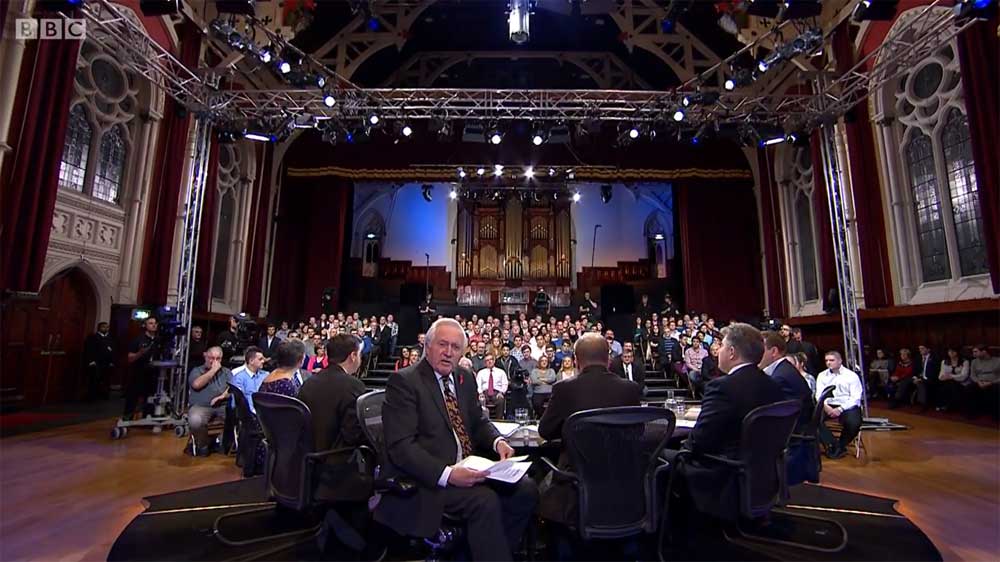
The subject was debated by the panel and the audience commented and asked further questions. It was exactly as you see it on the television. And then the whole thing became very surreal. The Steadicam operator stood behind Dimbleby, who turned around and very calmly said to camera, “Tonight, we’re in Middlesbrough on Teesside, and welcome to Question Time.”
The BBCQT theme music played as the cameramen repositioned themselves for shots of the panel. David introduced the panel, we applauded and it was time for the first question. The young lad in front of me calmly read, “Are the mainstream political parties in crisis?”
I’m not going to give a blow by blow account of the show itself. You can watch it on iPlayer if you’re so inclined. But the first (recorded) question became a debate about UKIP and how Nigel Farage has given politics a kick up the backside to the detriment of the other parties who seem to all be having a very rough time. The second question (“How will the UK look in 50 years time if immigration is allowed to continue as it is now?”) followed the same theme but this was where I knew I could make a point. I put my hand up. Stephen, sat to my right, whispered, “Oh no, what are you doing?”
I kept my hand up and tried to catch Dimbleby’s eye. He makes gestures to the audience to let them know who he’s going to come to next – you’ve probably seen him in the background when a panellist is speaking. I had no such warning.
Getting my fat face on the tellybox
Twenty nine minutes into the recording, a woman a couple of rows in front of me was saying that as long as we remain in the EU, we have no control over how many immigrants arrive. Dimbles said, “All right. Now the man behind you, in spectacles in the third row. You, sir. Third row from the back, yes.”
THAT’S ME! AAAARGH! I’VE NOW GOT TO SPEAK ON NATIONAL TELEVISION! AND I WAS REFERRED TO AS THE CLASSIC “MAN IN SPECTACLES”! PEOPLE ACROSS THE UK WOULD BE MARKING THIS OFF THE BBCQT BINGO CARD!
My heart was in my mouth. The boom mic was placed above my head. I looked up to make sure it was there and I started my point.
“Given that it’s emerged this week that EU immigrants have put in five billion pounds more than they have taken out of the UK economy, does this not show…”
I had to pause. The audience was applauding and I was only halfway through. As I waited for the applause to die down, I looked up for some reason. I have no idea why. I continued.
“…does this not show that the UKIP bluster about anti-immigration is nothing more than scaremongering?”
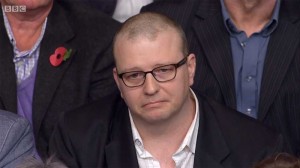 The audience applauded again. There was a whoop from somewhere down the front. I’d obviously hit a nerve. I believe that immigration is good for the country and for society as a whole. I believe that immigrants get a raw deal at the hands of the media and the far right parties.
The audience applauded again. There was a whoop from somewhere down the front. I’d obviously hit a nerve. I believe that immigration is good for the country and for society as a whole. I believe that immigrants get a raw deal at the hands of the media and the far right parties.
Dimbleby went to Matt Forde, the comedian. He agreed, but said there were other factors to take into consideration. He said, “You wanted to see what the UK would look like in 50 years time, the only way to get the deficit down, is if we continue to have the sort of immigration like we’ve had in the last ten.”
I was chuffed. It was like when you’re watching a football match and you make a comment about an event during the game seconds before the commentator makes the same comment. Really, I’m just glad I didn’t make an arse of myself.
The rest of the show
The whole thing went quickly. The local Labour MP, Andy McDonald, verbally mauled the Tory panellist, Brandon Lewis, for calling the north east “Newcastle”. McDonald said we were at the end of a branch line railway and had an airport with no planes.
Out of three UKIP candidates for the next election, two got to speak and Charles Kennedy pwned them.
Weird Man had his say on regional devolution, missing the point totally, and getting quite angry in the process. If you watch the show on iPlayer, you’ll see him at around fifty one minutes.
That’s all folks!
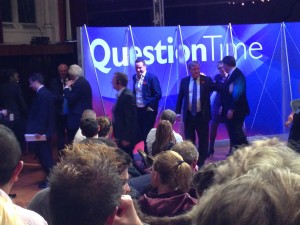 And then it was over. Dimbles told everyone where the show would be in the next fortnight, he thanked the panellists, us and the people at home and said goodnight. We applauded, and the theme music played very faintly. The stage manager appeared from the left, and asked us to remain where we are for the minute in case anything needed a retake. The word was that everything was good, and we could go. I’d quickly switched my phone on as soon as it was over and took the opportunity to grab a couple of photos of the panel leaving.
And then it was over. Dimbles told everyone where the show would be in the next fortnight, he thanked the panellists, us and the people at home and said goodnight. We applauded, and the theme music played very faintly. The stage manager appeared from the left, and asked us to remain where we are for the minute in case anything needed a retake. The word was that everything was good, and we could go. I’d quickly switched my phone on as soon as it was over and took the opportunity to grab a couple of photos of the panel leaving.
As I walked down the stairs to the front of the seating area, I spotted Dimbles talking to some of the audience and having photos taken. Could I be cheeky and ask for a photo? Could I really?
Of course I could.

You can find the show on iPlayer at http://www.bbc.co.uk/iplayer/episode/b04nyg09/question-time-06112014.

